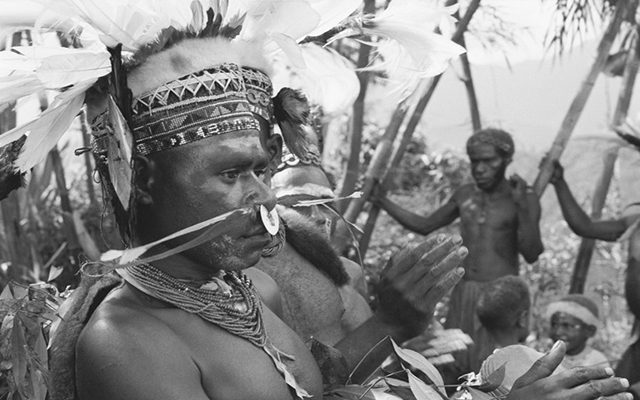
UC San Diego Library Awarded Recordings at Risk Grant to Preserve Melanesian Audio Recordings
Published Date
By:
- Leslie Luna
Share This:
Article Content
Communities assembling for a singsing celebration. Leaders discussing the origins of shell money. Elders narrating ship attacks and daily affairs. Young children performing village songs.
These are just a few snippets of at-risk sound recordings documenting the cultures of the Pacific Islands from seven different collections within the world-renowned Tuzin Archive for Melanesian Anthropology at the University of California San Diego. These curated recordings will now be digitized and preserved for scholarly use thanks to a grant from the Council on Library and Information Resources (CLIR). The grant program is made possible by funding from The Andrew W. Mellon Foundation.
The UC San Diego Library is one of 20 recipients of the Recordings at Risk award, designed to support the preservation of rare and unique audio content of high scholarly value through digital reformatting.
The Library’s Special Collections & Archives will use the grant to digitize and preserve nearly 800 reel-to-reel and cassette tape field recordings including rare interviews, songs, performances, indigenous languages and oral histories collected in Papua New Guinea and the Solomon Islands from the mid-to-late 20th century — a time when ethnographic fieldwork began to flourish in remote locations around the globe.
“This grant will enable the Library to preserve these unique recordings and make them available for teaching and research, directly supporting the university’s mission to create and disseminate knowledge by engaging in public service,” said Erik Mitchell, the Audrey Geisel University Librarian. “Digital access to this content will provide the Pacific Islands communities with an opportunity to engage for the first time with their cultural heritage, preserve their language, history and collective memory.”
With this grant, there is potential for further collaboration with Pacific Islands communities to repatriate materials to their place of origin — a critical objective of the Tuzin Archive.
“It’s important to note that among Melanesian people, history is primarily passed through oral tradition. The knowledge contained in these audio recordings tell us of our past and provide glimpses about the environment and a former way of life,” said Tukul Walla Kaiku, Information and Communication Sciences lecturer at the University of Papua New Guinea. “It’s crucial that current generations are able to listen to the voices of the past.”
Over the years, the UC San Diego Library has built long-term partnerships with Pacific scholars and professional organizations such as the Pacific Manuscripts Bureau. Since the 1980s, several projects have emerged including a joint preservation project between the Library and the National Archives of Papua New Guinea to microfilm and index the PNG Patrol Reports, over 3,000 volumes of colonial reports dating from 1912-1976. Another project involves a collaboration with anthropologist David Akin, who’s been working to bring materials from the Tuzin Archive to the Kwaio community of Malaita in the Solomon Islands. He was instrumental in the opening of the Kwaio Archive, the first community-run archive in the Solomon Islands in 2016.
“The young Kwaio generations have embraced technology and are using cell phones to record their own interviews for the archive,” said Akin. “These tech tools have allowed the community to share the Kwaio archive more broadly in digital form. The audio recordings will bring the same enthusiasm and participation in the project which is vital to its success.”
The Tuzin Archive was founded in the early 1980s by the UC San Diego Department of Anthropology professors, Donald F. Tuzin and Fitz John Porter Poole, in partnership with the UC San Diego Library. Since then, more than 10,000 objects have already been digitized and are available through the Library’s Digital Collections website. By digitizing the related audio recordings, both the sights and sounds of the vibrant cultures of the southwest Pacific Islands can be experienced together, amplifying the collections’ reach and enabling new models of digital scholarship and teaching.
Share This:
You May Also Like
Stay in the Know
Keep up with all the latest from UC San Diego. Subscribe to the newsletter today.



